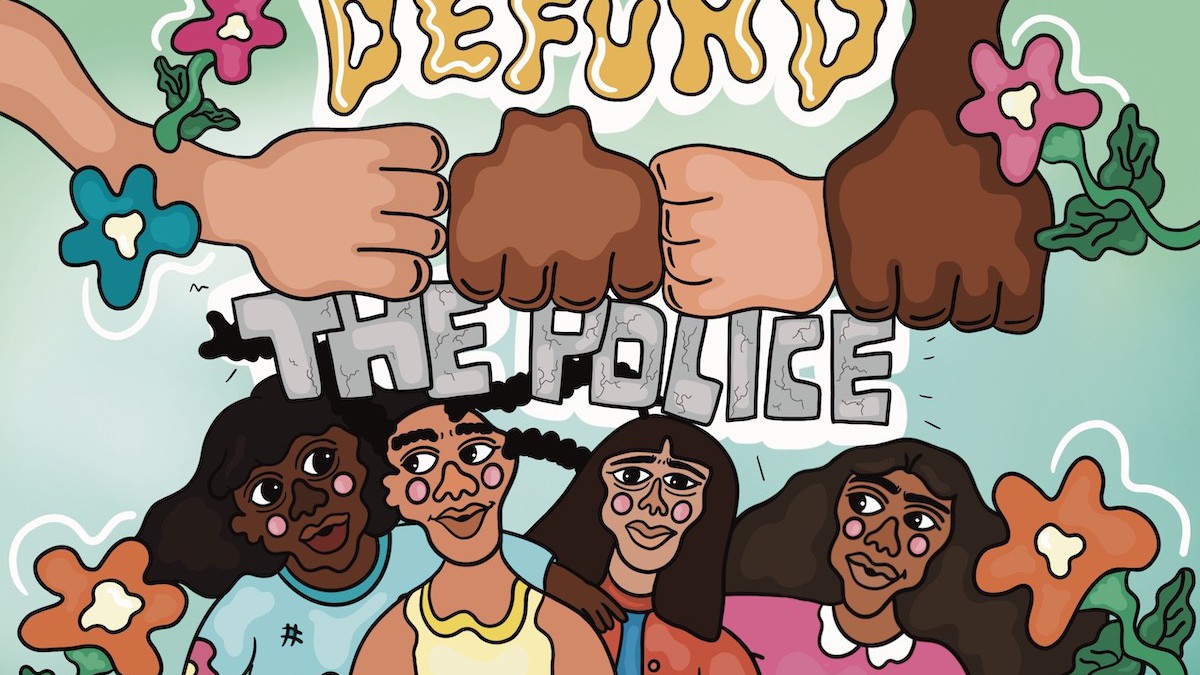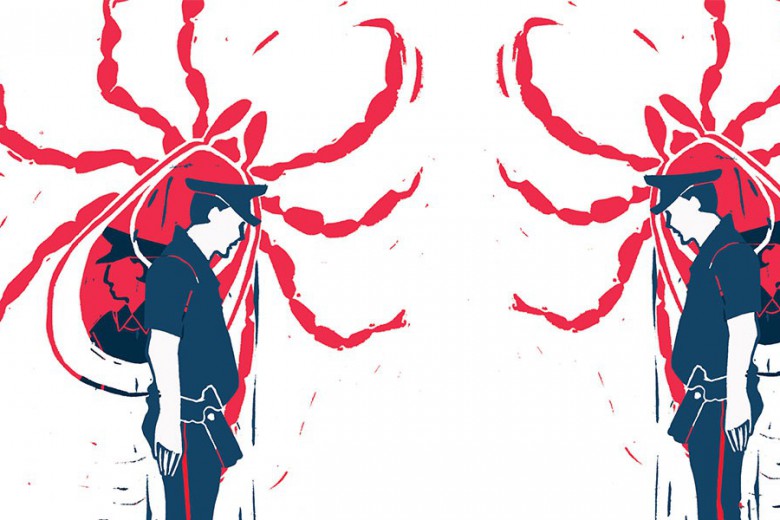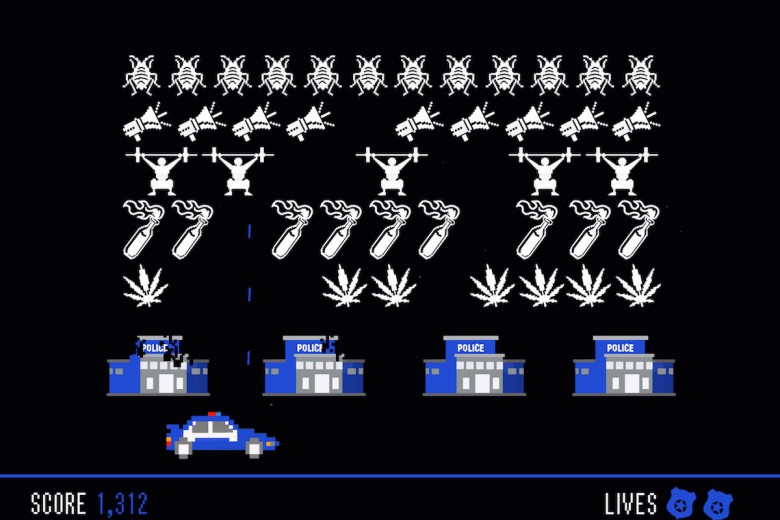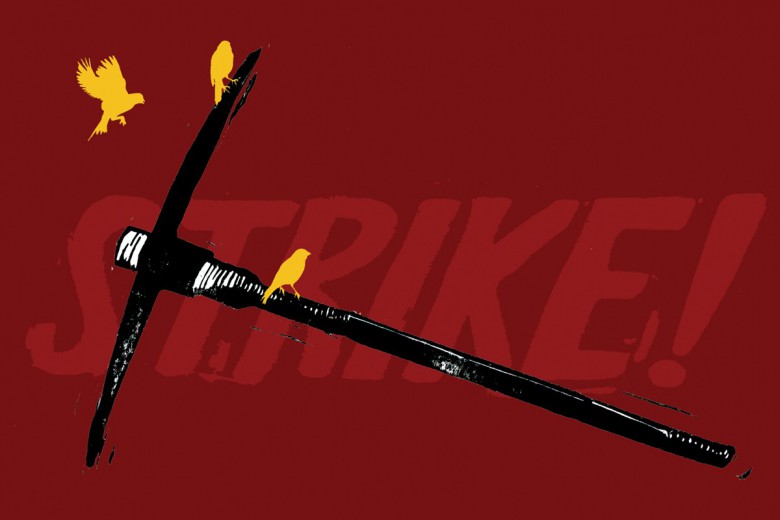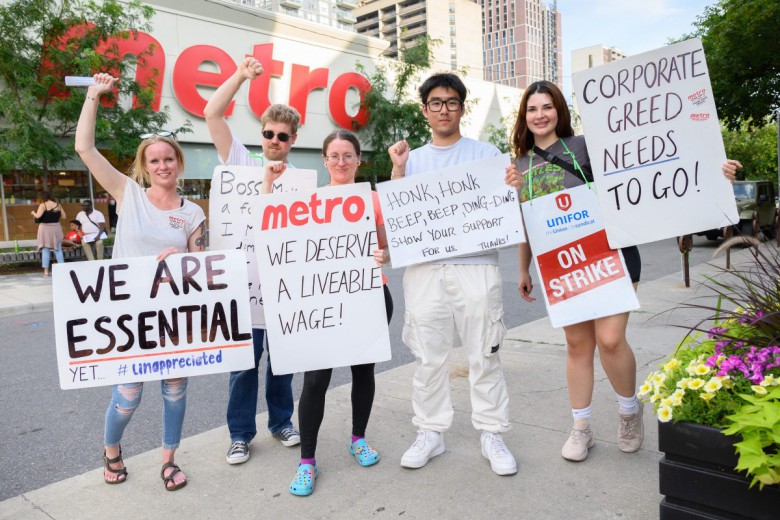On July 8, 2021, the RCMP killed Jared Lowndes, a father from the Laksilyu Clan of the Wet’suwet’en Nation. Lowndes was in a Tim Hortons parking lot in Campbell River when police vehicles surrounded him and an RCMP officer fatally shot him. He was the 50th person to be killed by police or to have died due to police actions in Canada this year alone.
A few days later, the National Police Federation, the union representing RCMP officers and the largest police union in Canada, justified Lowndes’s killing in a press release, asserting that had Lowndes turned himself in and complied with the terms of his outstanding warrant, he could be alive today.
The union’s message couldn’t be clearer: we support police officers’ right to kill.
As [police] unions push for more weapons and less accountability, everyday life becomes more dangerous for Black, Indigenous, and other overly policed community members.
Since last summer’s uprising for Black liberation, in which protesters called for an end to police brutality and racial injustice, police unions have come under closer scrutiny. For decades, these organizations have defended the murderous actions of law enforcement officers, and it is high time the labour movement reckoned with their roles in perpetuating police brutality, racism, state violence, and white supremacy.
The police were never supposed to have a union
The RCMP was created to further Canada’s colonial agenda by capturing formerly enslaved people, forcibly displacing Indigenous people from their land, and removing Indigenous children from their families in order to send them to residential “schools.”
In the United States, police unions themselves were once illegal because, as historian Aaron Bekemeyer writes, “[c]ity governments feared the negative political repercussions of permitting the independent organization of the agents of state violence.” For decades the police weren’t accepted into the labour movement. In 1897, the American Federation of Labor rejected a bid for unionization from Cleveland police officers, asserting that “it is not within the province of the trade union movement to especially organize policemen, no more than to organize militiamen, as both policemen and militiamen are often controlled by forces inimical to the labor movement.” In Canada, the Toronto Police Union was briefly chartered by the Trades and Labour Congress in 1918, before a 1919 Royal Commission overturned the ruling on the basis that a labourer was a producer, but a police constable was not; so it was “not advisable for the Toronto police force to continue ‘to hold its present charter.’”
Despite early recognition by both the labour movement and the Canadian government that police aren’t workers, in 1944, an emergency order-in-council gave many groups of government employees the right to collectively bargain, including the majority of law enforcement officers.
With the added political and bargaining power of their unions, officers have won contracts thick with protections, and their disciplinary standards are so lax it has resulted in increased police brutality.
The decision to grant police union certification created conditions ripe for abuse. Police officers already wielded significant social power, as well as actual firepower. With the added political and bargaining power of their unions, officers have won contracts thick with protections, and their disciplinary standards are so lax it has resulted in increased police brutality. Police unions shield officers from accountability in the aftermath of misconduct and bargain for the impunity of officers in the face of the law.
Abdul N. Rad’s master’s thesis at the University of Oxford studied the hundred largest U.S. cities and found that the extent of protection in police contracts was directly and positively correlated with police violence against communities. A 2019 University of Chicago study found that extending collective bargaining rights to Florida sheriffs’ deputies led to a 40 per cent statewide increase in cases of violent misconduct. A U.S. study released in March 2021 found that gaining collective bargaining rights triggered discriminatory use of force by police against racialized civilians. The researchers found that the number of deaths attributable to unionization increased steadily throughout the 1970s, reaching at least 30 additional deaths of non-white people per year in the ’80s. Between 1959 and 1988, police gaining collective bargaining rights was positively correlated with a 10 per cent increase in non-white deaths at the hands of law enforcement.
Unions are a necessary vehicle for workers to build power and resist capitalist exploitation – but when it comes to police, the labour movement’s power is being used to uphold state violence, to the detriment of workers and community members. As their unions push for more weapons and less accountability, everyday life becomes more dangerous for Black, Indigenous, and other overly policed community members.
Unions have won officers the right to extra protections after misconduct, including paid leave and legal counsel. In Canada, correctional officers in federal prisons can have their disciplinary records expunged after two years, providing them with a clean history should they try to change workplaces or move to a higher-ranking position. Police and correctional officers can also file grievances through their union whenever they deem the disciplinary actions of their employer unjust.
A 2019 University of Chicago study found that extending collective bargaining rights to Florida sheriffs’ deputies led to a 40 per cent statewide increase in cases of violent misconduct.
Alex* used to work as a union representative where he assisted members – including police officers – with filing grievances. He remembers one case he was handed from the union local concerning a police officer who was facing criminal charges for brutally beating a man after handcuffing him and bringing him into the station. After being fired from the police force, the officer asked his union to justify his actions so his dismissal could be overturned.
Alex didn’t think the case stood a chance in arbitration, so he denied the officer representation. But as soon as he was given the case, he recalls thinking, “There’s no way I’m going to go to a hearing.” He explains that he doesn’t want to defend police brutality – reasoning he thinks other union representatives should employ to deny representation to law enforcement officers filing similar grievances. Luckily, Alex never had to represent police officers for egregious use of force, but he warns that it’s only a matter of time.
“At some point, an officer is going to kill somebody [...] and [the union is] going to have to review this and analyze whether that was justified or not,” he says. “Are we comfortable defending someone who has the legal right to kill?”
It’s not just the grievance process that’s abused by law enforcement, but the right to strike as well.
When workers go on strike, they aim to create an organizational and administrative nightmare for their employer, forcing the employer to agree to their demands. But in their day-to-day work, law enforcement officers are licensed to interpret and enforce legislation and control community members as they see fit – authoritative power they can use for their own personal gain in a labour dispute.
“At some point, an officer is going to kill somebody [...] and [the union is] going to have to review this and analyze whether that was justified or not,” he says. “Are we comfortable defending someone who has the legal right to kill?”
Rae,* a staffer at a Canadian public-sector union, explains to Briarpatch that if police officers want to pressure management, in theory they can give a ticket to every person speeding one kilometre over the limit; border services agents can invasively search every single traveller; and prison guards can discipline prisoners more than usual. This is called work-to-rule, and it’s a pressure tactic where workers follow workplace rules to the letter in order to slow down productivity while avoiding disciplinary action.
In fact, border services officers did just that during their strike in August. Operating under work-to-rule, officers stopped collecting taxes and duties, asked travellers every question in their training manual, and conducted full vehicle searches. While for some travellers the only consequence was longer wait times at the border, for others, these invasive actions can have harmful and even deadly consequences. As Rae puts it, “If [police] start ticketing every single person, the likelihood of someone being killed by the police goes up exponentially.”
Complicity
Following last summer’s calls for institutional accountability from the Black Lives Matter movement, the Canadian Labour Congress (CLC), the central labour body with which most Canadian unions are affiliated, came out in support of the movement to defund the police and reallocate funds to community and social programs.
In an interview with Rabble in the summer of 2020, Marie-Clarke Walker of the CLC said that no police unions have membership with the Congress – not because they’re not welcome, but because none have applied.
It’s true that unions exclusively representing law enforcement operate independently of the Congress, but the CLC is affiliated with numerous unions that count law enforcement officers – from border guards to correctional officers – among their ranks, including the Public Service Alliance of Canada (PSAC), the Canadian Union of Public Employees (CUPE), the Ontario Public Service Employees Union (OPSEU), the British Columbia Government and Service Employees’ Union (BCGEU), the Saskatchewan Government and General Employees’ Union (SGEU), and the Manitoba Government and General Employees’ Union (MGEU). As well, in 2015, the CLC intervened in a Supreme Court of Canada case to argue alongside the Canadian Police Association for the right of RCMP officers to unionize.
[I]f police officers want to pressure management, in theory they can give a ticket to every person speeding one kilometre over the limit; border services agents can invasively search every single traveller; and prison guards can discipline prisoners more than usual.
Union leaders and police reformists defend the presence of cops in membership by arguing that unions need the dues; that expelling law enforcement would invite broader attacks by austerity-minded governments on public-sector unionism; that if they don’t unionize police, another union will; and that by unionizing police, they can help mitigate officers’ bad behaviour. But union leadership needs to realize that any vision of a labour movement that includes members of law enforcement decidedly excludes Black, Indigenous, and other racialized workers, as well as every other community and union member who is targeted by the police.
Earlier this year, Tina* and her co-workers were organizing their workplace, a non-profit organization in Quebec serving racialized, queer, and trans youth. They were considering joining the Confédération des syndicats nationaux’s community workers’ union, but as they were organizing, CSN was making headlines for raiding Ontario corrections officers, a practice where unions attempt to steal members of other unions.
The topic of law enforcement officers in unions featured prominently in the organizing talks between Tina’s co-workers. Many of the non-profit’s staff, as well as the population they serve, are targeted by the police, making joining a union “family” alongside law enforcement an affront to their values and a threat to their safety.
“You know, my peers and my friends would be like, ‘Why the fuck would I join a union? They’ve got cops here. I’m not going to participate in this.’”
Ultimately, Tina and her co-workers didn’t unionize for other reasons. But for Tina, a leftist and a penal abolitionist, police presence “would absolutely be why [I wouldn’t join a union].” She adds, “You know, my peers and my friends would be like, ‘Why the fuck would I join a union? They’ve got cops here. I’m not going to participate in this.’”
Tina believes that unions are an indispensable tool for workers to leverage power against the ruling class, and removing law enforcement officers from the labour movement is a critical step in the larger movement to defund and abolish the police. But as long as unions defend and expand policing, Tina can’t see herself getting involved.
The movement to kick cops out of labour
Ever since police won the right to unionize, rank-and-file workers have been pushing for their expulsion from the labour movement. In 2018, after CUPE announced that they had organized nearly 1,300 RCMP telecom operators and intercept monitor analysts, membership pushed back and created the campaign Cops Out Of CUPE.
The campaign demands that their unions move past superficial solidarity statements and take concrete action to defund the police by rejecting the growing presence of law enforcement in membership, publicly supporting defunding campaigns, and putting an end to co-sponsoring events with law enforcement.
More recently, in response to the 2020 uprisings for Black liberation, rank-and-file union members and staffers representing roughly nine different Canadian unions created Labour for Defunding Police. The campaign demands that their unions move past superficial solidarity statements and take concrete action to defund the police by rejecting the growing presence of law enforcement in membership, publicly supporting defunding campaigns, and putting an end to co-sponsoring events with law enforcement. Last spring, in partnership with Briarpatch, Labour for Defunding Police hosted their first event, a webinar to help union members and staffers push for their locals to come out in support of the campaign.
As unions wrestle with questions of racial justice, union leadership should view excluding police from the labour movement as an opportunity to evolve past their racist roots of “whites-only” constitutions and toward a more equitable, just and intersectional labour movement. Disaffiliating from agents of the state that brutalize Black, Indigenous, and racialized community and union members is the necessary next step.
*Alex, Rae, and Tina all chose to use pseudonyms in order to protect their jobs.


